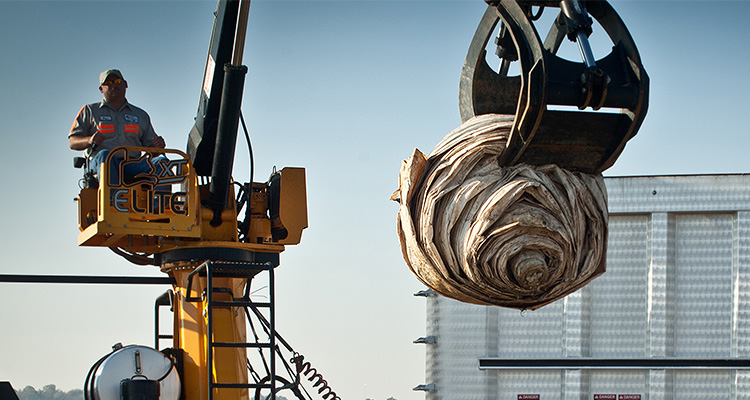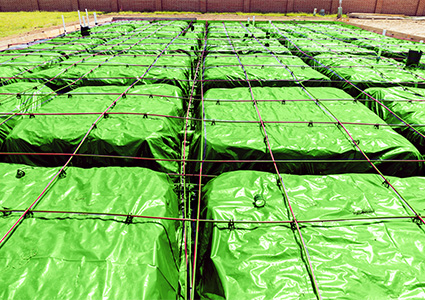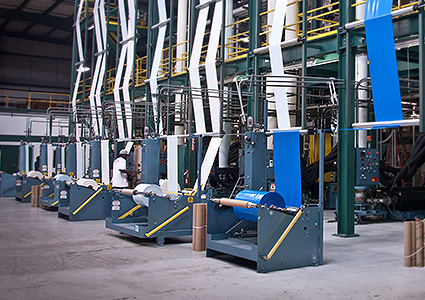
Revolution’s cutting-edge circular sustainability model redefines the future of plastics
For almost three decades, Revolution has dared to think differently about plastics, seeing potential where others saw landfills and waste. Recognizing plastic as a valuable resource that can have infinite usefulness if reclaimed and reused responsibly, the company has developed an integrated, sustainable loop business model to effectively manage and control the entire lifecycle of plastics. In fact, Revolution’s core purpose is to create more value from plastics and more efficiency for customers, with less impact on the environment by championing sustainable loop solutions. Scott Coleman, President and CEO, provides an insightful introduction to the business.
“At Revolution, we specialize in providing circular and sustainable solutions for flexible plastic. In other words, we offer a fully integrated manufacturing solution

that involves collecting products with recycled content after their end-of-life and recycling these goods back into resin. This resin can then be used to manufacture new products. We have been engaged in this circular process for nearly 30 years across the US and Canada. Today, our product range encompasses all kinds of flexible plastics and films for use in commercial, households, and agricultural applications. Although our comprehensive service offering may vary by application, our primary focus remains on fostering circularity, increasing the amount of post-consumer recycled (PCR) content that we put into our products, and reclaiming and recycling as much end-of-life product as possible to reintegrate it into our system,” he opens.
Extensive research and development (R&D) is an essential step in embracing this groundbreaking approach. Scott explains what goes into Revolution’s new product development and the refining of its recycling operations to facilitate the reuse of plastics. “While we have been involved in manufacturing operations for several decades, the recycling component of our business represents a relatively new industry. Currently, less than five percent of flexible films are recycled, with even less than one percent of the content in new films or new flexible plastic being derived from recycled sources. Over the decades, we have found a niche for ourselves, with R&D and innovation serving as a cornerstone of our business. We have championed the incorporation of PCR content back into flexible films. Our innovation and R&D processes are deeply ingrained in our daily operations. We are constantly challenging the status quo and aiming to break through new ground by improving our operational capabilities. One of the most notable innovations we came up with was elevating the quality of PCR content in linear low-density polyethylene PCR to a level where it could safely be utilized in food-grade applications. This achievement enabled us to obtain a Letter of Non-Objection (LNO) from the Food and Drug Administration (FDA) for the use of our PCR resins in food-grade applications,” he enlightens.
An integral aspect of the product development and manufacturing stages involves sourcing the materials that Revolution recycles. Scott tells us more about the origins and collection processes of these materials, which are crucial to the company’s operations. “In line with our dedication to client satisfaction, we prioritize extended producer responsibility and provide extra service to our customers by facilitating the reclaiming of waste or used products after their useful life. Specifically focusing on our own flexible film products, whether utilized in agriculture or commercial stretch films, we explore how we can collaborate with our customers to develop a collection program for bringing these products back to our facilities after their useful lifespan. By establishing this chain of custody, we know how the product was made and how it was used. As a result, we can ensure a structured return process, which allows us to maintain circularity principles as well as the integrity of the system,” he says.
To complement the organic growth fueled by its focus on innovation, Revolution has completed a series of acquisitions in the last year. Touching on this topic, Scott reveals how the company’s acquisition strategy has empowered it to reach its ultimate goals. “Building on our substantial growth in internal innovation, we realized the potential for our applications and methodologies to be extended quite rapidly into adjacent markets and geographies. This realization prompted us to make several strategic investments over the past year, aimed at enhancing our capabilities and expanding our reach.
 “Consequently, we acquired two recycling facilities, one in Canada and another in Michigan. The acquisition in Canada was geared towards geographical expansion, while the Michigan facility was intended to bolster our capabilities in commercial and distribution film recycling. In addition to these recycling facilities, we invested in two manufacturing operations. One was headquartered in Tennessee, focusing on applications in agriculture and cotton wrap, and the other in Wisconsin, dedicated to agricultural bale wrap, stretch film, and shrink bundling. All of these investments are closely aligned with the circular system for flexible plastics described earlier, reflecting our commitment to expanding both our capabilities and our market presence to promote the adoption of circular solutions for flexible plastics,” he states.
“Consequently, we acquired two recycling facilities, one in Canada and another in Michigan. The acquisition in Canada was geared towards geographical expansion, while the Michigan facility was intended to bolster our capabilities in commercial and distribution film recycling. In addition to these recycling facilities, we invested in two manufacturing operations. One was headquartered in Tennessee, focusing on applications in agriculture and cotton wrap, and the other in Wisconsin, dedicated to agricultural bale wrap, stretch film, and shrink bundling. All of these investments are closely aligned with the circular system for flexible plastics described earlier, reflecting our commitment to expanding both our capabilities and our market presence to promote the adoption of circular solutions for flexible plastics,” he states.
Dedicated to change
As a large-scale plastic recycling company, Revolution is passionate about supporting and fostering sustainability in the plastic manufacturing industry. Scott shares his views on what needs to change in order to create a more sustainable sector. “I believe that it is primordial for our industry to prioritize the incorporation of PCR content, as it is a fundamental aspect of sustainability. Although we have made significant strides in reducing material usage in our products through down-gauging, our circular ecosystem is what makes us truly sustainable. Without reusing and recycling PCR content, it would be hard to claim that we are truly being sustainable. Therefore, at Revolution, we advocate for the industry to accelerate its adoption of the incorporation of PCR content into flexible products.”
Naturally, the industry-wide adoption of PCR content to foster sustainability does not solely depend on Revolution but should instead be a collective effort. Aware of this, the company strives to ensure its supply network operates with the same policies and ideals. “Given our significant vertical integration, we have found that in some cases, we need to take the initiative ourselves as we get a more sustainable output by leveraging this vertical integration. That said, it is important for every manufacturer to enforce the same strict standards of safety, sustainability, and business ethics for all of their suppliers. While we work hard to excel as a sustainable company, it is equally crucial that we extend our support to others pursuing the same goals, as otherwise, we would be undermining our own efforts,” Scott expresses.
Revolution’s collaborative approach permeates through its company culture, which Scott is keen to discuss with us. “Alongside the safety and wellbeing of our team members, which are of the utmost importance to us, innovation and growth are at the core of our culture. We seek to attract professionals who think outside the box, are highly disciplined, and are dedicated to making a change in our industry. This results in a team with significant energy and enjoyment in our mission, with a collective focus on growth, innovation, and idea generation,” he ends.
Thanks to its groundbreaking circular model, Revolution is poised to leave a long-lasting positive impact on the plastics industry.